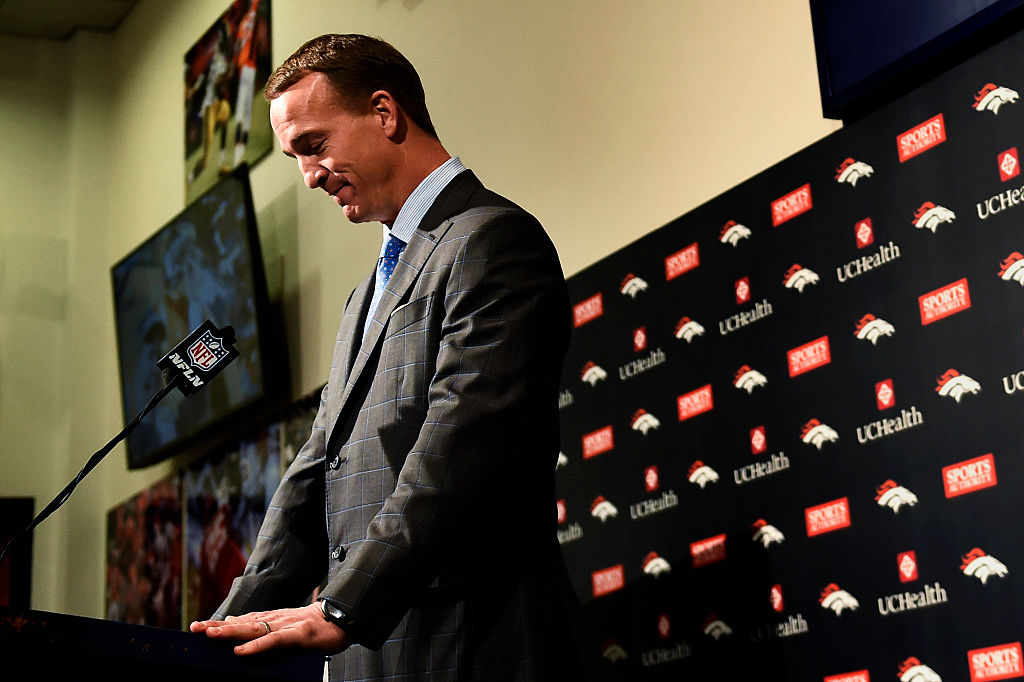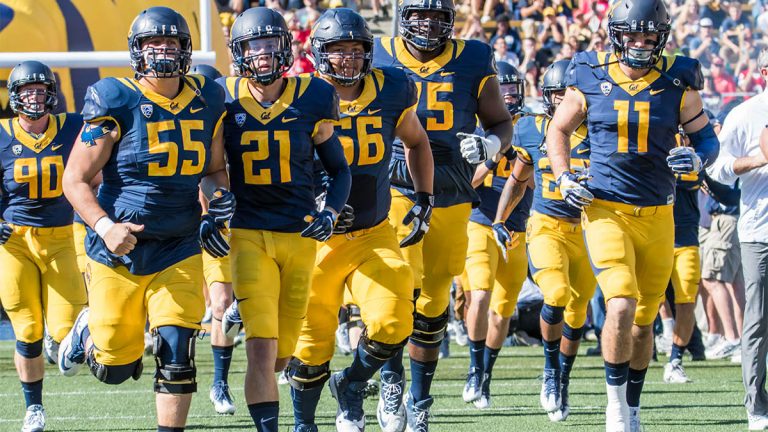After Sport, a College Athlete’s Identity Loss Can Harm their Mental Health
Why this matters
The transition from college to the working world often is seen as a simple move after graduation. But for college athletes whose lives have been built around their sports prowess, the change can bring an identity crisis and mental health trouble.
It was a brisk November night. As I left the Virginia State University football stadium for the last time after turning in my equipment, Kendrick Lamar’s “Sing About Me, I’m Dying of Thirst” played in my headphones, and I looked back at the gate. Tears rolled down my face. Fifteen years of my existence – sweating and striving with a feeling of purpose, building friendships and a sense of identity, all while playing a sport that I deeply loved – would soon fade away. I wondered: who was I, now? And what would I do next?
I grew up dreaming of playing college football. When I got the chance to play linebacker for Virginia State, a historically black Division II school in central Virginia, the experience did not disappoint. From hearing the Trojan Explosion marching band hype up the crowd during hot afternoons in Rogers Stadium to attending postgame parties with Big Blue teammates who were like brothers, my time as an athlete was, in a word, intoxicating.
I got to play in a Colonial Intercollegiate Athletic Association (CIAA) championship game, my final game with the program, which I closed out with the game-winning tackle. Yet the most emotional moment of my football career came at the very end as I left the stadium for that final time.
My grieving process had begun.
Today, mental health is my job – and my calling. I’m a clinical social worker and psychotherapist, with a focus in my private practice on supporting athletes. While earning my doctorate, I researched how college athletes transition out of sports, focusing on how athletic identity and socialization impacted their quality of life after athletics. And that’s why I can say, with great confidence, that my experience of grief over the conclusion of my football career is hardly unique. For many college athletes, the end of their playing days creates serious and significant mental and emotional challenges.
I can remember the first time those challenges entered my life. During the summer of 2014, a close college classmate died. Following their funeral, my former football teammates and I gathered at my mother’s house for a cookout. At first, they were busting my chops about my decision to pursue a master’s degree in social work and eventually become a mental health professional – but soon enough they expressed admiration and respect for my swift transition out of sports, asking questions like “how did you do it?” and “how did you switch up so fast?” Later, one of them called me on the phone. He was feeling insecure, and he was having a difficult time coping with the fact that, for the first time since he was four years old, he would enter the fall as neither a football player nor a student.
Like any social institution, college sport provides participants with roles, responsibilities, a welcoming tribe, and even a sense of meaning. When athletes exit all of that – in what arguably amounts to the earliest retirement experience in American culture – it can be disorienting, jarring, and traumatic. Suddenly, athletes have to reinvent themselves as human beings. Process their feelings of loss and grief. Find a pathway to another occupation, hoping it will be as exhilarating as playing sports. And, since few dedicated, athlete-centered support systems exist, do most of this on their own.
What sort of specific challenges do college athletes face as they navigate their transitions out of sports? Here’s what the research on their lived experiences – and what I’ve seen as a practitioner – tells us:
1. How you retire matters. Athletes know that they won’t be able to play at a high competitive level forever. Even Tom Brady and LeBron James will have to hang their sneakers up someday. However, there can be a major psychological difference between voluntary and involuntary retirements. In the former, an athlete chooses to walk away, often because they have lost the desire to keep playing or are ready to pursue new and different social and professional opportunities. In the latter, by contrast, sports are taken away from an athlete: by a sudden injury, a lost scholarship, or simply not being selected to participate at the next level of competition.
Involuntary retirement is often more traumatic and intense, with athletes experiencing significant emotional and mental dysfunction, anxiety and depression, anger, and loss and grief. Some experience suicidal ideation during their transitions. Others, as I have seen as a therapist, have turned to substance abuse to cope with the ongoing physical pain they suffer from injuries that forced them to retire.
2. Finding an identity outside of sport is vital. Many college athletes experience “identity foreclosure,” in which an individual assumes an identity or role without exploring or developing other alternative identities or interests. The increasingly ultra-competitive youth sports funnel leading to college sports only exacerbates this phenomenon, with children assuming athletic identities at younger and younger ages in order to get noticed or be successful.
In my professional and personal experience, athletes who view themselves solely through the lens of competition are more likely to have challenges when transitioning. A narrow focus restricts their opportunities for other kinds of social and professional enrichment, leaving them feeling unprepared for life after sports.
3. Being prepared takes work. Research shows that some college athletes feel prepared for the next steps in their life, while others experience disorientation and dissatisfaction. In my practice, I see athletes who report feelings of not knowing what to do and who often meet the criteria for a clinical diagnosis of Generalized Anxiety Disorder. When development before and during college is dominated by athletic pursuits, there can be little self-motivated or self-guided contemplation about how to prepare for a transition from sport.
4. Research is lacking when it comes to an athlete’s transition. When I first began to study this area, I realized that research, mainstream articles, and other social discussion around it largely lacked clinical and mental health terminology. The transition from college sports is often seen solely as a matter of professional development. To cope, athletes are taught basic interviewing concepts, personal branding, and how to use the skills they’ve learned in their sport to make inroads with corporate America.
But that’s not the whole story. Most athletes approaching transition are experiencing an active clinical diagnosis termed by the Diagnostic and Statistical Manual of Mental Disorders as an “Adjustment Disorder with Mixed Anxiety and Depressed Mood.” Essentially, when someone goes through a life transition, it can be accompanied by anxiety or depressive symptoms, as well as by a grief and loss experience. When ignored or overlooked, this emotional and mental discomfort can stop athletes from taking advantage of professional development opportunities. It also can create poor coping skills, which in turn can lead to additional mental health challenges.
5. Culture informs transition. Research shows that athletes from unique cultural backgrounds can have more challenges with transitioning. While renegotiating their identities, Black college athletes are less likely to have external resources back home or outside of their schools that can help – such as internships, entry-level jobs, and adequate mental health care. Black male or male-identifying athletes typically have challenges integrating into social settings such as the boardroom, classroom, and other spaces that do not include sport or some athletic component. They feel alienated. Black youth also tend to receive more pressure than their white peers from members of their communities to excel at athletics. All of this can affect an athlete’s willingness to disengage from their athletic self, as well as how they process and reimagine their identity following what can amount to a social death.
***
Given the situations described above, what can athletes and schools do to improve transitions out of college sport?
First, athletes should take more control of their own futures, seeking independent development in spaces outside of their sport. At the same time, teams and athletic departments should give athletes sufficient time, opportunities, and encouragement to engage in self-directed exploration of who they are away from the court or the field.
Athletes also should be encouraged to partake in pre-transition counseling, in individual or group settings, with a licensed mental health professional in order to identify triggers and points of concern regarding their lives after sport. A preventive, proactive approach can help greatly to alleviate feelings of being “blindsided” by the challenges of “figuring life out.”
Last but not least, parents, guardians, coaches, educators, and other community members need to encourage holistic development before athletes ever matriculate into college sports, making sure that tomorrow’s linebackers and liberos do not limit their imaginations about who they are and what they can do outside of competition.
This spring, we see many college athletes soaking up life advice from commencement speakers, receiving their degrees, and throwing their graduation caps into the air. It’s a joyous occasion, but it’s also one that marks the beginning of a potentially difficult journey. By understanding the emotional and mental challenges athletes face and ensuring that more resources are available for them, we can help make their transitions easier – and ultimately, more successful.
Please see our list of Mental Health Resources if you are seeking information or assistance regarding mental health.
Monthly Issue
Mental Health: A New Priority in Sport
Athletes continue to tell us they are not OK with their actions and words. In response, the sports industry has acknowledged it can and should be doing more to support the people who are its lifeblood, from athletes to coaches and beyond.
Sport is both reckoning with its roots, uncovering how history and habit created circumstances that don’t suit everyone who competes, as well as navigating new territory during a time of unprecedented strain on our mental well-being. By making mental health a priority, sport has an opportunity to confer a host of benefits supporting mental wellness and to be more safe, inclusive, and inspiring.




